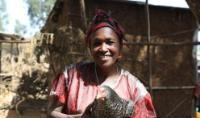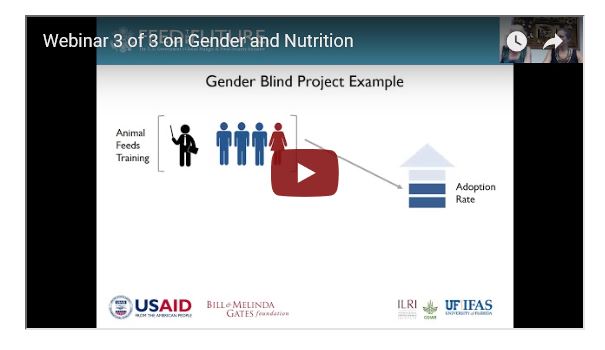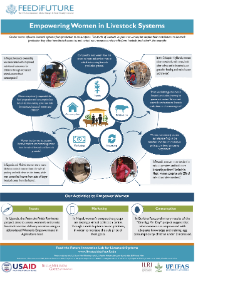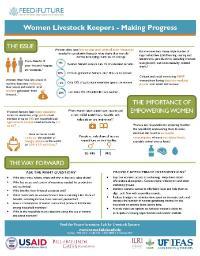Gender and Youth
Access and control over productive resources as well as the benefits from livestock production, processing and marketing are not equitable. Although women play essential roles from the production to consumption of nutritious foods they are often disadvantaged in terms of access to information, services, or markets that could improve their livelihoods. However, although gender is a key barrier, it is not the only one. In this cross-cutting theme we pursue an intersectional approach that considers gender and age as well as other factors that limit opportunities for individuals in the livestock sector, such as caste, race, religion, education, employment, and socio-economic status. The main areas of focus under this cross-cutting theme include:
- Women and youth engagement: Research on how women’s and youth engagement in livestock systems contribute to achieving the U.S. Government Global Food Security Strategy objectives.
- Women’s and youth empowerment: Research on livestock-related strategies to empower women and improve dietary outcomes for children. This focal area includes how to overcome constraints to technology adoption by women and youth in the livestock sector.
- Entrepreneurship and private sector engagement: Studies to determine entry points and strategies to overcome barriers to women’s and youth involvement in livestock systems, including researching opportunities for entrepreneurship to generate sustainable livelihoods.
- Gender and nutrition: Research on the role of boys and men in improving household nutrition.
All recipients of research awards will be required to integrate gender and youth considerations into project design and implementation. Helpful tools for doing so include the Feed the Future Project Design Guide for Youth-Inclusive Agriculture and Food, the forthcoming USAID livestock and gender toolkit, and resources generated during Phase I. Where appropriate, we also plan to use the Women’s Empowerment in Livestock Index tool to measure women’s empowerment. Progress monitoring will involve using specific indicators designed to measure impacts from a gendered intersectional approach.
Phase I resources
Although the importance of gender has been recognized by donors, governments and international organizations, it is important to ensure that gender is integrated into research practice. Each research project is different, but many face challenges when trying to integrate gender into different types of activities at various project stages. Through a webinar series and video training materials, we developed practical materials to help researchers integrate gender at each stage of the project cycle. This includes identifying the benefits of integrating gender into the design, data analysis and reporting stages of the project cycle, and outlining strategies for inclusion in later project stages, even if it had not previously been incorporated. This process can help project teams succeed at gender integration in each phase of the project or help projects get back on track if they have faced setbacks.
In addition, we have compiled an Annotated Bibliography on gender-related research from the Livestock Systems Innovation Lab’s target countries and value chains related to gender and livestock. It consolidates research that brings a gender lens to the study of the livestock sector and raises awareness of this literature base and potential for new areas of inquiry related to gender and livestock value chains.
Resources
Course for Researchers

Journal Articles
Colverson, K., Harris-Coble, L. N., Galie, A., Moore, E., Munoz, O. and McKune, S.L. 2020. Evolution of a gender tool: WEAI, WELI and livestock research. Global Food Security, Volume 26. https://doi.org/10.1016/j.gfs.2020.100375
Colverson, K. June 2018. Increasing the Health and Nutritional Outcomes of the Government of Rwanda’s “One Cow per Poor Family” Program from a Gender Perspective. Food Studies: An Interdisciplinary Journal 8(2): 31-44. Urbana, Illinois, USA. https://doi.org/10.18848/2160-1933/CGP/v08i02/31-44
More Resources (newest first)
Video: Adapting the WEAI into the Women's Empowerment in Livestock Index (WELI) - Presented at the Innovation Labs Gender Afinity Group, USA, November 2023.
Presentation: Integrating Men and Boys into Household Nutrition – Why is it Important? Presented at Gender Equality in Rural Advisory Services (GFRAS) Annual Meeting, Chile, October 2022.
Toolkit: Eckman, A.K., Williamson, J., Cheney, K., and Mesfin, Z. 2022. Toolkit to Address Gender-Based Violence in Agriculture and Market Systems Development. Prepared by EnCompass LLC for the United States Agency for International Development.
Spreadsheet: Feed the Future. Resource Compendium: Gender-Based Violence in Agriculture and Other Sectors. Excel spreadsheet. 2022.
Profile: “Bring Your Wife, Your Daughter or Your Sister”: Dr. Kathleen Colverson on Gender in Agricultural Development. Agrilinks, June 2022.
Video: Integrating Gender throughout the Project Life Cycle of Innovation Labs. Presented by the Feed the Future Innovation Lab for Peanut, and featuring Dr. Kathy Colverson (at 31:33)
Workshop in Rwanda on Train the Trainers (March 8-10, 2021):
- Presentation: Engaging men in supporting maternal and child consumption of milk and other animal source foods in Rwanda
- Facilitator's Guide (Word file)
- Report: Training of Trainers virtual workshop (Word file)
Infographic: Empowering Women in Livestock Systems
Infographic: Women Livestock Keepers - Making Progress
Workshop in Cambodia on Pork Value Chain:
- Integrating gender & nutrition into the project planning cycle of the pork VC
- Day One of gender and nutrition workshop
- Day Two of gender and nutrition workshop
- Case Study for Cambodia: Integrating Gender & Nutrition into Food Safety Issues
- Webinar series: Integration of gender and nutrition into livestock research projects
- Bibliography: Gender and livestock value chains: Annotated bibliography
- Manual: Training manual for researchers:: Integrating gender and nutrition into the project cycle of livestock research.
- Presentation: Increasing the Health and Nutritional Outcomes of Rwanda’s “One Cow per Poor Family” from a Gender Perspective.
- Brief: Gender in the dairy value chain and implications for the GIRINKA program (“One Cow per Poor Family”) in Rwanda.
- Presentation: Why Integrate Gender into Livestock Research? The Importance of Systems Thinking.
External Resources (click)
Leadership of Gender and Youth









